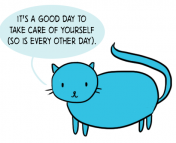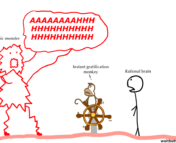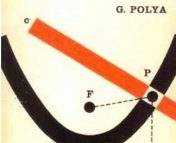Looking at the night sky through a telescope for the first time is a formative experience for many astronomy enthusiasts. There is something very humbling about bringing the details that evade the naked eye into focus and witnessing the sheer scale of the universe: those pin points in the sky or the fuzzy specks you’re not sure you’re actually seeing are, in fact, absolutely massive and ancient by human standards. While spending an hour observing the cosmos can be mentally nourishing, what happens when you observe for a whole night? Or for multiple nights in a row, as many telescope operators and observers do?
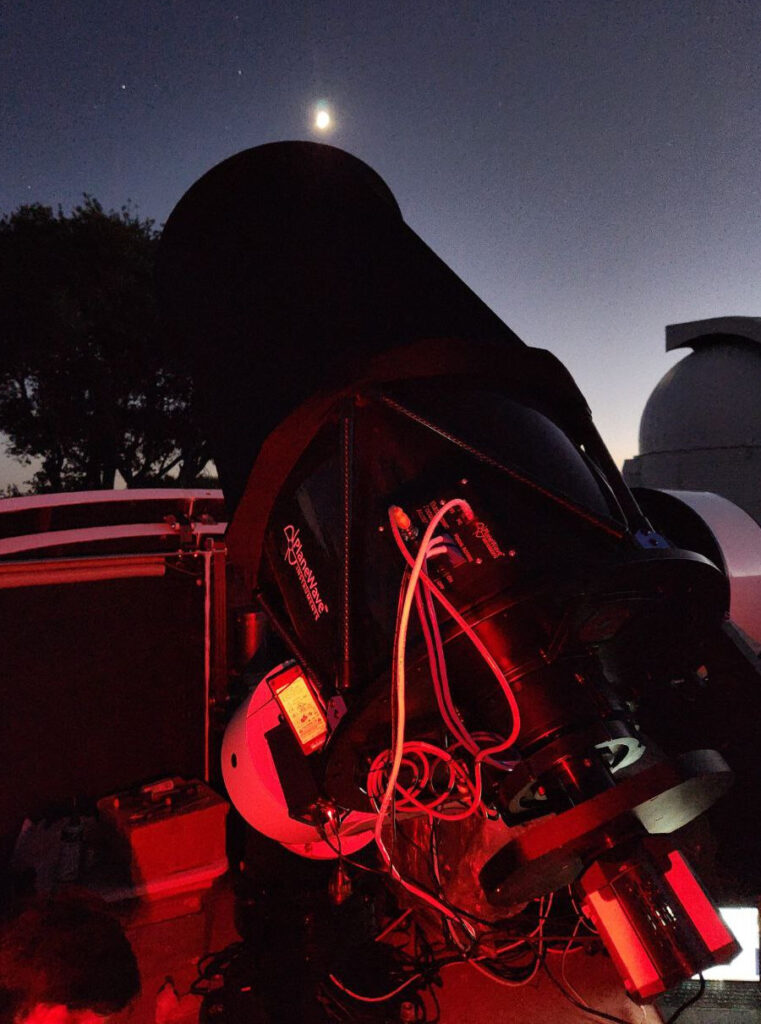
Observing for science’s sake rather than observing’s sake is akin to a rite of passage for many early astronomers and is simply a necessity for many others. How an observing run works varies from observatory to observatory and from science case to science case. Sometimes you need several hours to detect a transit of an exoplanet, or to collect spectral data on several objects that need around 10 minutes per object, or to detect a transient event that you’re not sure will occur. Sometimes observing starts as “early” as 3pm and ends as “late” as 7am so that both the data and images for calibrating the data can be collected. And though sometimes astronomers get to be at the observatory while obtaining their data (see Figure 1), more often than not, the astronomer is going to be sitting in front of a computer screen watching the magic happen (see Figure 2).
This means that collecting data can require spending the entire night staring at a computer screen (even if the dome never opens). Many who are familiar with pulling an all-nighter know how unpleasant this is. Because the onus of collecting data through this method is unavoidable for many astronomers, this astrobite will focus on the effects that observing can have on health and ways that observing could be made less harmful.
Before getting into the meat of this bite, it is worth emphasizing that everybody– and every body– is different. No two people are going to have the same reaction to stimuli, the same circadian rhythm, metabolism, etc.The goal of this bite is to raise awareness of the effects that observing can have and provide possible resources to mitigate those effects, from one observer to another.
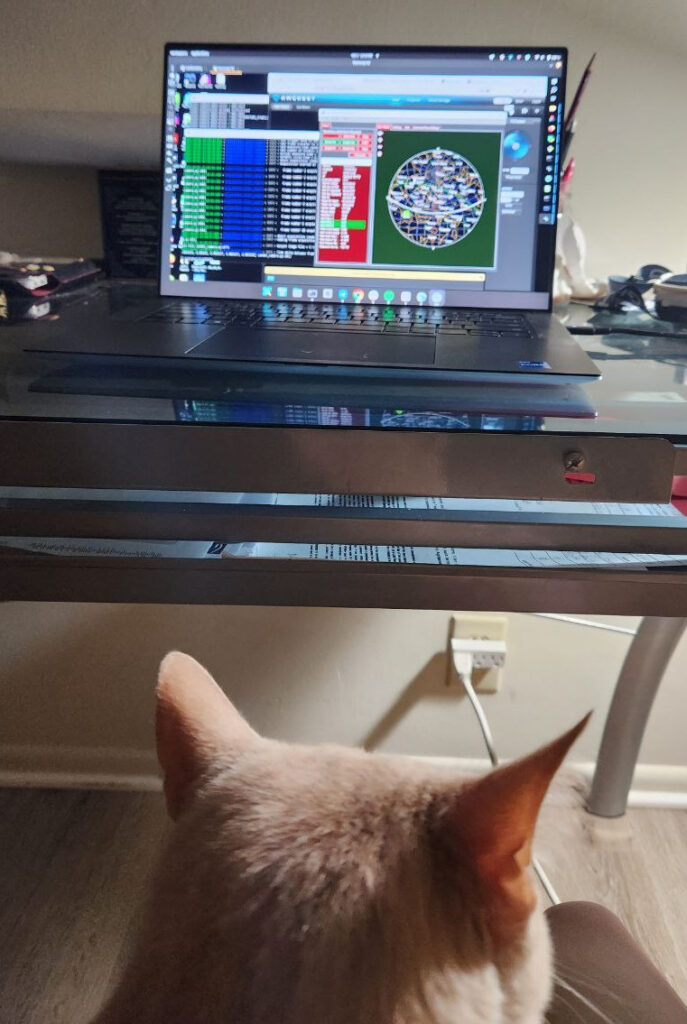
Health effects of modified sleep schedule and environment
Some of the consequences of staying up way past your bedtime are apparent or well-known: increased irritability, difficulty focusing, brain fog, fatigue, weakness, and exhaustion. Staying up late can increase your cortisol levels– the hormone related to stress. In addition to elevating your stress, cortisol has its own slew of negative effects, many of which are related to those previously mentioned.
Unfortunately, one of the best ways to combat acute increases in cortisol levels is to make sure you’re getting enough sleep (not exactly helpful in the scenario when you’re observing). In lieu of sleeping, you can minimize cortisol spikes by avoiding caffeine while observing. While this might seem somewhat counter-intuitive to the goal of staying awake, your body is likely to appreciate it the next day. Making sure you’re drinking enough water and taking breaks to stretch or move can increase blood flow to decrease cortisol levels, help maintain wakefulness, and help make sure your body is getting the nutrients it needs to stay awake and study the sky. If you’re going to take a caffeine hit, it’s better to do it at the start of the night rather than continuously throughout the night since it can disrupt your sleep and reduce your sleep quality when you’re finally able to get it.
Effects of light exposure
A part of the modified environment of observing is the extended exposure to light. The day/night cycle of light is crucial to our circadian rhythm, and the introduction of artificial light has produced a variety of issues related to disrupting that rhythm. In some ways, our body’s natural response to being exposed to light comes in handy for staying awake during observations– staring at a computer screen, especially in a room with the lights on, makes your body think it’s daytime and time to be active. Unfortunately, exposure to light when your body doesn’t expect it is also linked to increased cortisol levels and the associated side effects. Blue light in particular is associated with poor sleep performance.
There is no way to avoid being exposed to atypical light patterns while observing, but there are some steps you can take to make your transition to sleep easier (even if the Sun is already rising). Keeping the lights on while observing can be helpful for maintaining wakefulness, but as you approach the end of the observing run, dimming the lights will help condition your body to prepare for sleep. Doing this a couple hours before the end of the night, in addition to turning on the “night light” mode on your computer or wearing blue-light glasses to reduce the amount of blue light, should make going to sleep easier and higher quality so you can more adequately recover from the long night.
Effects on Eating Habits
Having to observe late at night can introduce an entire extra meal into your eating routine. And, quite frankly, sometimes the most exciting thing you can do while observing is have a little treat. And you should eat! Staying up late takes energy– you need to replenish it. A part of the difficulty with observing at night is the kinds of food you have access to.
The types of places where you can get food late at night are primarily going to be fast food restaurants (if your observing room is near civilization at all). The kind of food available at such restaurants are going to be high in fat and carbohydrates and low in fiber. These sorts of foods are fast, convenient, and generally affordable, but they also contribute to drowsiness and fatigue– not exactly ideal for staying awake. Preparing more well-rounded meals ahead of time is the most straight-forward solution, but it requires both more foresight as well as more time and energy. An alternative solution is keeping high-fiber and high-protein snacks nearby; yogurt, nuts, seeds, fruits and veggies, eggs, and similar foods are more likely to provide long-term satiation and energy to get through the night. And, as always, drink water!
Overall, eating late at night can lead to gastro-intestinal (i.e. tummy) problems and increased blood sugar driven largely by the simple act of eating when your body isn’t accustomed to needing to digest food. The difference in metabolism at night also affects your ability to feel satisfied or full after a meal. Because of this, the earlier in the night you can eat, the better.
Concluding Remarks
Perhaps a lot of the recommendations given here are obvious: minimize caffeine intake, stay hydrated, and eat balanced meals. But, when it’s 3am and you’ve got two to three more hours to stay awake, it’s easy to forget the basics of taking care of yourself. It’s also easy to take for granted all the things, health-related or otherwise, you need when you’re awake. Observing requires eating extra meals, keeping the lights on for extra hours, using fuel and electricity to make extra food and drinks, and prolonged active cognition, all of which require more energy, mental activity, and money. There are additional hidden deficits like the impacts on oral health as well as the fact that needing to sleep during the day reduces your ability to engage with the community– to get lunch with peers, to engage effectively (or at all) in meetings, to go to talks, or to even reduce and analyze the data you just spent the night collecting.
While this bite primarily focused on ways to mitigate the adverse effects of an individual night of observing, the effects of long-term observing, sleep-schedule reversals, and sleep deprivation warrants its own discussion in the astronomical community. Regular disruptions to the circadian rhythm have been found to be related to heart disease, weakened immune systems, neuro-degenerative diseases like Alzheimer’s, and other physical and mental illnesses. The progress of astronomy has, does, and indefinitely will rely on observations from ground-based observatories that require nightly monitoring from astronomers, engineers, and telescope support staff. It should be considered crucial that we find ways to make one of the most important aspects of astronomy a less severe occupational hazard.
Astrobite edited by Erica Sawczynec
Featured image adapted from UCSC Lick Observatory and PNGTree

